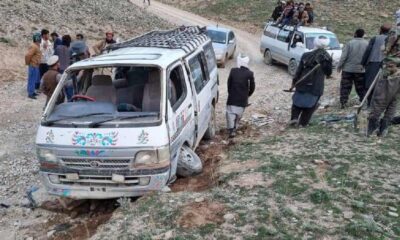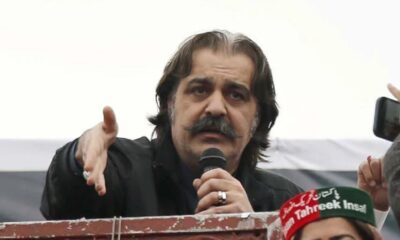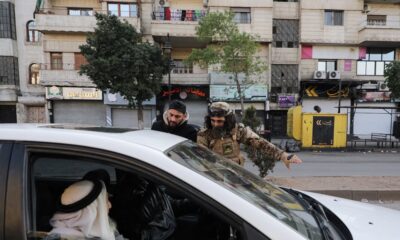World
Biden hits Russia with new sanctions for ‘premeditated’ Ukraine attack
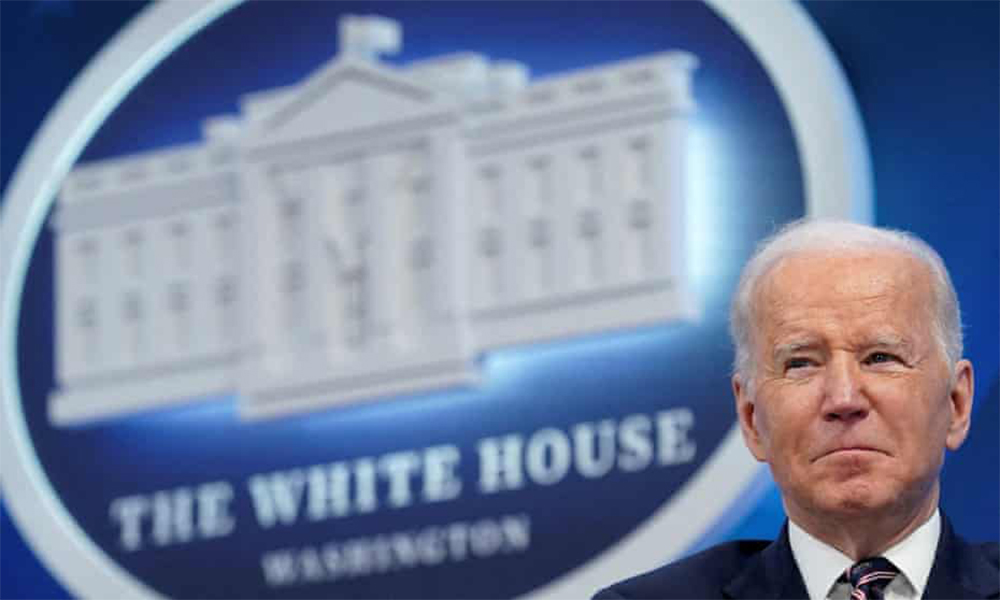
President Joe Biden hit Russia with a wave of sanctions on Thursday after Moscow invaded Ukraine, measures that impede Russia’s ability to do business in major currencies along with sanctions against banks and state-owned enterprises, Reuters reported.
Biden described Russian President Vladimir Putin as an aggressor with a “sinister vision of the world” and a misguided dream of recreating the Soviet Union.
But he held back from imposing sanctions on Putin himself and from disconnecting Russia from the SWIFT international banking system, amid differences with Western allies over how far to go at this juncture and criticism from Republicans that he should have done more.
According to Reuters Ukrainian forces battled Russian invaders on three sides on Thursday, prompting tens of thousands of people to flee their homes.
“This is a premeditated attack,” Biden told reporters at the White House. “Putin is the aggressor. Putin chose this war. And now he and his country will bear the consequences.”
Biden said the sanctions were designed to have a long-term impact on Russia and to minimize the impact on the United States and its allies. And he said Washington was prepared to do more.
The sanctions are aimed at limiting Russia’s ability to do business in dollars, euros, pounds and yen. Among the targets were five major banks, including state-backed Sberbank and VTB, as well as members of the Russian elite and their families. Sberbank, Russia’s largest lender, will no longer be able to transfer money with the assistance of U.S. banks.
The White House also announced export restrictions aimed at curbing Russia’s access to everything from commercial electronics and computers to semiconductors and aircraft parts, read the report.
‘DANGEROUS MOMENT’
Biden said NATO would meet on Friday to map out further measures and reiterated that the United States would not engage in war with Russia. But he said the United States would meet its Article 5 commitments, in which NATO members agree an armed attack against one of them in Europe or North America will be considered an attack against them all. Since Ukraine is not a NATO member, those protections do not apply.
Biden said this was “a dangerous moment for all of Europe,” and that he had authorized troops that had been placed on standby to deploy to Germany. He declined to comment on whether he would urge China to join the West’s drive to isolate Russia.
U.S. Senate Republican leader Mitch McConnell said the world was watching how Washington responds, Reuters reported.
He said Congress would support “truly devastating sanctions” against the Kremlin, but he said Biden should have imposed tough sanctions early enough to deter an invasion and weaken Russia.
“Sadly, deterrence after the fact is not deterrence at all,” McConnell said in a statement.
Biden met with his counterparts from the Group of Seven allies and his National Security Council on Thursday, after speaking with Ukrainian President Volodymyr Zelenskiy late on Wednesday.
His announcement represented the second major tranche of sanctions against Russia since Putin earlier this week declared two breakaway regions of Ukraine independent and sent troops there.
The United States had warned it would initiate waves of sanctions against Moscow if it further invaded Ukraine, and Russia’s full-on military assault launched on Thursday led to the latest round of Western penalties, read the report.
White House press secretary Jen Psaki later told reporters the Biden administration believes Putin has “grander ambitions than Ukraine” without offering further details.
On Wednesday Washington imposed sanctions on the company in charge of building Russia’s Nord Stream 2 gas pipeline, and on Tuesday it sanctioned two large Russian financial institutions and Russian sovereign debt along with some members of the Russian elite and their family members.
The moves are aimed at pushing up inflation and interest rates in Russia, lowering purchasing power, investment, growth and living standards, White House economic adviser Daleep Singh told reporters on Thursday.
Biden has become the face of the Western response to Russian aggression at a time when he is battling low poll numbers at home, rising inflation that could be exacerbated by the Ukraine conflict, and looming midterm elections that could hand control of the Senate and House of Representatives from his fellow Democrats to Republicans, Reuters reported.
Officials said he briefed leaders in the U.S. Congress about the Ukraine crisis during a secure call on Thursday.
The White House has warned Americans that the conflict could lead to higher fuel prices in the United States, though it is taking measures to help soften that blow. U.S. officials have been working with counterparts in other countries on a combined release of additional oil from global strategic crude reserves, two sources said on Thursday.
Biden warned oil and gas companies not to “exploit” this moment to raise prices.
World
As Iran tensions build, US military moves warplanes to reinforce Middle East
U.S. President Donald Trump threatened Iran on Sunday with bombing and secondary tariffs if Tehran did not come to an agreement with Washington over its nuclear program.
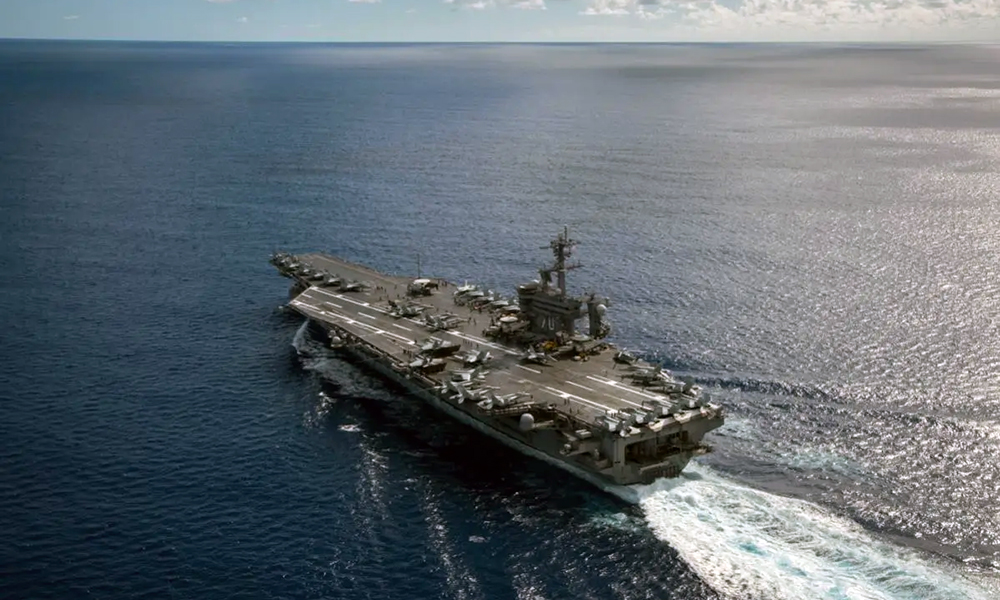
U.S. Defense Secretary Pete Hegseth has reinforced U.S. military capability in the Middle East with more warplanes, the Pentagon said on Tuesday, amid a more than two-week-old U.S. bombing campaign in Yemen and mounting tensions with Iran, Reuters reported.
The Pentagon’s brief statement did not specify which aircraft were being deployed or where precisely they were sent.
However, as many as six B-2 bombers have relocated in the past week or so to a U.S.-British military base on the Indian Ocean island of Diego Garcia, according to U.S. officials, speaking on condition of anonymity.
Experts say that puts the B-2s, which have stealth technology and are equipped to carry the heaviest U.S. bombs and nuclear weapons, in an ideal position to operate in the Middle East.
“Should Iran or its proxies threaten American personnel and interests in the region, the United States will take decisive action to defend our people,” Pentagon spokesperson Sean Parnell said in a statement.
The U.S. military’s Strategic Command has declined to say how many B-2s have reached Diego Garcia and noted that it does not comment on exercises or operations involving the B-2.
There is already considerable firepower in the Middle East and the U.S. military will soon have two aircraft carriers in the region, read the report.
U.S. President Donald Trump threatened Iran on Sunday with bombing and secondary tariffs if Tehran did not come to an agreement with Washington over its nuclear program.
While B-2 bombers have been employed to strike buried Houthi targets in Yemen, most experts say use of the stealthy bomber is overkill there and the targets aren’t buried so deeply.
However, the B-2 is equipped to carry America’s most potent bomb — the 30,000-pound GBU-57 Massive Ordnance Penetrator. That is the weapon that experts say could be used to strike Iran’s nuclear program.
There are only 20 B-2 bombers in the Air Force’s inventory so they are usually used sparingly.
Iran’s Supreme Leader Ayatollah Ali Khamenei said on Monday the U.S. would receive a strong blow if Trump followed through with his threats.
Revolutionary Guards Aerospace Commander Amirali Hajizadeh threatened U.S. forces in the Middle East, noting American bases in the Middle East and adding: “They are in a glass house and should not throw stones.”
One official told Reuters that the U.S. military was also moving some air defense capabilities from Asia to the Middle East.
In his 2017-2021 term, Trump withdrew the U.S. from a 2015 deal between Iran and world powers that placed strict limits on Tehran’s disputed nuclear activities in exchange for sanctions relief. Trump also reimposed sweeping U.S. sanctions.
Since then, Iran has far surpassed that deal’s limits on uranium enrichment.
Western powers accuse Iran of having a clandestine agenda to develop nuclear weapons capability by enriching uranium to a high level of fissile purity, above what they say is justifiable for a civilian atomic energy program. Tehran says its nuclear program is wholly for civilian energy purposes.
World
Israel kills Hezbollah official in deadly Beirut airstrike

An Israeli airstrike killed four people including a Hezbollah official in Beirut’s southern suburbs on Tuesday, a Lebanese security source said, further testing a shaky ceasefire between Israel and Iran-backed Hezbollah.
The Israeli military said the official – Hassan Bdeir – was a member of a Hezbollah unit and Iran’s Quds Force, and he had assisted the Palestinian group Hamas in planning a “significant and imminent terror attack against Israeli civilians,” Reuters reported.
The Lebanese security source said the target was a Hezbollah figure whose responsibilities included the Palestinian file. The Lebanese health ministry said the strike killed four people – including a woman – and wounded seven others.
It marked Israel’s second airstrike in the Hezbollah-controlled suburb of Beirut in five days, adding to strains on the U.S.-brokered ceasefire that ended last year’s devastating conflict.
The attacks on Beirut’s southern suburbs have resumed at a time of broader escalation in the region, with Israel having restarted Gaza strikes after a two-month truce and the United States hitting the Iran-aligned Houthis of Yemen in a bid to get them to stop attacking Red Sea shipping.
Hezbollah lawmaker Ibrahim Moussawi said the Israeli attack amounted to “a major and severe aggression that has escalated the situation to an entirely different level”.
Speaking in a televised statement after visiting the building that was struck, he called on the Lebanese state to “activate the highest level of diplomacy to find solutions”.
Israeli Foreign Minister Gideon Saar said the eliminated Hezbollah operative posed “a real and immediate threat”. “We expect Lebanon to take action to uproot terrorist organizations acting within its borders against Israel,” he said.
Israel dealt severe blows to Hezbollah in the war, killing thousands of its fighters, destroying much of it arsenal and eliminating its top leadership including Hassan Nasrallah.
Hezbollah has denied any role in recent rocket attacks from Lebanon towards Israel, including one that prompted Israel to carry out an airstrike on the southern suburbs last Friday.
Tuesday’s strike in the early hours appeared to have damaged the upper three floors of a building, a Reuters reporter at the scene said, with the balconies of those floors blown out.
The glass on the floors below was intact, indicating a targeted strike. Ambulances were at the scene as families fled to other parts of Beirut.
There was no advance warning, in contrast to the attack on Friday when the Israeli military announced which building it intended to hit and ordered residents to leave the area.
Lebanese President Joseph Aoun condemned the latest airstrike, calling it a “dangerous warning” that signals premeditated intentions against Lebanon, which would intensify diplomatic outreach and mobilise international allies.
Lebanese Prime Minister Nawaf Salam said the strike was a flagrant breach of a U.N. Security Council Resolution upon which the ceasefire was based, and the ceasefire arrangement.
U.S. BACKS ISRAEL
The ceasefire agreement demanded that southern Lebanon be free of Hezbollah fighters and weapons, that Lebanese troops deploy into the area, and that Israeli troops withdraw.
But each side accuses the other of failing to implement the terms fully. Israel says Hezbollah still has infrastructure in the south, while Lebanon and Hezbollah say Israel is occupying Lebanese soil by not withdrawing from five hilltop positions.
The U.S. State Department said that Israel was defending itself from rocket attacks that came from Lebanon and that Washington blamed “terrorists” for the resumption of hostilities.
“Hostilities have resumed because terrorists launched rockets into Israel from Lebanon,” a State Department spokesperson said in an email, responding to a question from Reuters seeking reaction to Tuesday’s airstrike. Washington supported Israel’s response, the spokesperson said.
The Israel-Hezbollah conflict was ignited when Hezbollah opened fire in support of Hamas at the start of the Gaza war. It escalated in September when Israel went on the offensive, declaring the aim of securing the return home of tens of thousands of people evacuated from homes in the north.
The war uprooted more than a million people and killed at least 3,768 people in Lebanon, according to a Lebanese health ministry toll from November. Dozens more have been reported killed by Israeli fire since the ceasefire.
Lebanon’s figures do not distinguish between civilians and fighters.
During the war, Hezbollah strikes killed 45 civilians in northern Israel and the Israeli-occupied Golan Heights. At least 73 Israeli soldiers were killed in northern Israel, the Golan Heights, and in combat in southern Lebanon, according to Israeli authorities.
World
Trump says Zelenskiy wants to back out of critical minerals deal

U.S. President Donald Trump said on Sunday Ukrainian President Volodymyr Zelenskiy wants to back out of a critical minerals deal, warning the Ukrainian leader would face big problems if he did.
“He’s trying to back out of the rare earth deal and if he does that he’s got some problems, big, big problems,” Trump told reporters.
“He wants to be a member of NATO, but he’s never going to be a member of NATO. He understands that.”
(Reuters)
-

 World5 days ago
World5 days agoMyanmar quake death toll hits 1,700 as aid scramble intensifies
-

 Sport5 days ago
Sport5 days agoIPL 2025: Gujarat Titans beat Mumbai Indians by 36 runs
-

 Latest News4 days ago
Latest News4 days agoSwitzerland re-establishes presence in Kabul with humanitarian office
-
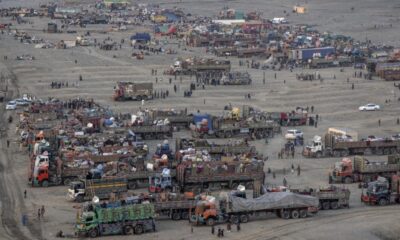
 Latest News4 days ago
Latest News4 days agoPakistan plans to expel 3 million Afghan refugees this year
-

 World4 days ago
World4 days agoSouth Korea, China, Japan seek regional trade amid Trump tariffs
-
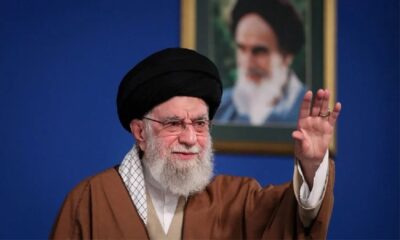
 Regional4 days ago
Regional4 days agoIran’s Khamenei warns of ‘strong’ response if US attacks
-

 Latest News3 days ago
Latest News3 days agoAfghanistan’s reconstruction is in the interest of EU: Uzbek president
-

 Latest News3 days ago
Latest News3 days agoUS won’t rest until all Americans detained in Afghanistan brought home: Rubio


